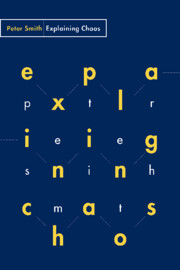9 - Randomness
Published online by Cambridge University Press: 22 September 2009
Summary
Return once more to our paradigm of a chaotic system, the Lorenz model. The time evolution of trajectories in this system is deterministic. But the precise sequence of events – so many turns around the left wing of the attractor, followed by so many turns around the right wing, followed by another visit to the left wing, and so on – typically seems quite patternless: the visits to the two wings appear to be randomly distributed. Is there any good sense, however, in which there really is objective randomness here? What are we to make e.g. of Joseph Ford's often-quoted remark ‘chaos is merely a synonym for randomness’ (Ford 1989, 350)? If there is a notion of randomness appropriate for describing deterministic chaotic models, can it usefully be carried over to describe the world? And how can we empirically distinguish true deterministic chaos and its sort of randomness from mere random noise? These are the central questions for this chapter.
But first, a brief comment about the claim that standard chaotic models are deterministic. John Earman's remarkable Primer (Earman 1986) teaches us that many questions about determinism are trouble-some and can require considerable care to get straight. Still, the claim being made here does seem fairly unproblematic.
Earman himself starts, as is now popular, from a definition of determinism for worlds.
- Type
- Chapter
- Information
- Explaining Chaos , pp. 147 - 164Publisher: Cambridge University PressPrint publication year: 1998



